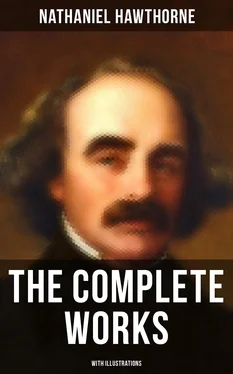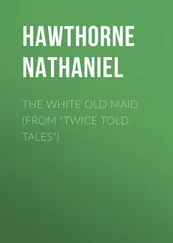The gloom of his thoughts — a mood of mind the more intolerable to him, because so unusual — had driven him to Hugh Crombie’s inn in search of artificial excitement. But even the wine had no attractions; and his first glass stood now almost untouched before him, while he gazed in heavy thought into the glowing embers of the fire. His companion perceived his melancholy, and essayed to dispel it by a choice of such topics of conversation as he conceived would be most agreeable.
“There is a lady in the house,” he observed. “I caught a glimpse of her in the passage as we came in. Did you see her, Edward?”
“A lady!” repeated Edward, carelessly. “What know you of ladies? No, I did not see her; but I will venture to say that it was Dame Crombie’s self, and no other.”
“Well, perhaps it might,” said the other, doubtingly. “Her head was turned from me, and she was gone like a shadow.”
“Dame Crombie is no shadow, and never vanishes like one,” resumed Edward.
“You have mistaken the slipshod servant-girl for a lady.”
“Ay; but she had a white hand, a small white hand,” said the student, piqued at Edward’s contemptuous opinion of his powers of observation; “as white as Ellen Langton’s.” He paused; for the lover was offended by the profanity of the comparison, as was made evident by the blood that rushed to his brow.
“We will appeal to the landlord,” said Edward, recovering his equanimity, and turning to Hugh, who just then entered the room. “Who is this angel, mine host, that has taken up her abode in the Hand and Bottle?”
Hugh cast a quick glance from one to another before he answered, “I keep no angels here, gentlemen. Dame Crombie would make the house anything but heaven for them and me.”
“And yet Glover has seen a vision in the passageway, — a lady with a small white hand.”
“Ah, I understand! A slight mistake of the young gentleman’s,” said Hugh, with the air of one who could perfectly account for the mystery. “Our passageway is dark; or perhaps the light had dazzled his eyes. It was the Widow Fowler’s daughter, that came to borrow a pipe of tobacco for her mother. By the same token, she put it into her own sweet mouth, and puffed as she went along.”
“But the white hand,” said Glover, only half convinced.
“Nay, I know not,” answered Hugh. “But her hand was at least as white as her face: that I can swear. Well, gentlemen, I trust you find everything in my house to your satisfaction. When the fire needs renewing, or the wine runs low, be pleased to tap on the table. I shall appear with the speed of a sunbeam.”
After the departure of the landlord, the conversation of the young men amounted to little more than monosyllables. Edward Walcott was wrapped in his own contemplations; and his companion was in a half-slumberous state, from which he started every quarter of an hour, at the chiming of the clock that stood in a corner. The fire died gradually away; the lamps began to burn dim; and Glover, rousing himself from one of his periodical slumbers, was about to propose a return to their chambers. He was prevented, however, by the approach of footsteps along the passageway; and Hugh Crombie, opening the door, ushered a person into the room, and retired.
The newcomer was Fanshawe. The water that poured plentifully from his cloak evinced that he had but just arrived at the inn; but, whatever was his object, he seemed not to have attained it in meeting with the young men. He paused near the door, as if meditating whether to retire.
“My intrusion is altogether owing to a mistake, either of the landlord’s or mine,” he said. “I came hither to seek another person; but, as I could not mention his name, my inquiries were rather vague.”
“I thank Heaven for the chance that sent you to us,” replied Edward, rousing himself. “Glover is wretched company; and a duller evening have I never spent. We will renew our fire and our wine, and you must sit down with us. And for the man you seek,” he continued in a whisper, “he left the inn within a half-hour after we encountered him. I inquired of Hugh Crombie last night.”
Fanshawe did not express his doubts of the correctness of the information on which Edward seemed to rely. Laying aside his cloak, he accepted his invitation to make one of the party, and sat down by the fireside.
The aspect of the evening now gradually changed. A strange wild glee spread from one to another of the party, which, much to the surprise of his companions, began with and was communicated from, Fanshawe. He seemed to overflow with conceptions inimitably ludicrous, but so singular, that, till his hearers had imbibed a portion of his own spirit, they could only wonder at, instead of enjoying them. His applications to the wine were very unfrequent; yet his conversation was such as one might expect from a bottle of champagne endowed by a fairy with the gift of speech. The secret of this strange mirth lay in the troubled state of his spirits, which, like the vexed ocean at midnight (if the simile be not too magnificent), tossed forth a mysterious brightness. The undefined apprehensions that had drawn him to the inn still distracted his mind; but, mixed with them, there was a sort of joy not easily to be described. By degrees, and by the assistance of the wine, the inspiration spread, each one contributing such a quantity, and such quality of wit and whim, as was proportioned to his genius; but each one, and all, displaying a greater share of both than they had ever been suspected of possessing.
At length, however, there was a pause, — the deep pause of flagging spirits, that always follows mirth and wine. No one would have believed, on beholding the pensive faces, and hearing the involuntary sighs of the party, that from these, but a moment before, had arisen so loud and wild a laugh. During this interval Edward Walcott (who was the poet of his class) volunteered the following song, which, from its want of polish, and from its application to his present feelings, might charitably be taken for an extemporaneous production: —
The wine is bright, the wine is bright;
And gay the drinkers be:
Of all that drain the bowl tonight,
Most jollily drain we.
Oh, could one search the weary earth, —
The earth from sea to sea, —
He’d turn and mingle in our mirth;
For we’re the merriest three.
Yet there are cares, oh, heavy cares!
We know that they are nigh:
When forth each lonely drinker fares,
Mark then his altered eye.
Care comes upon us when the jest
And frantic laughter die;
And care will watch the parting guest —
Oh late, then let us fly!
Hugh Crombie, whose early love of song and minstrelsy was still alive, had entered the room at the sound of Edward’s voice, in sufficient time to accompany the second stanza on the violin. He now, with the air of one who was entitled to judge in these matters, expressed his opinion of the performance.
“Really, Master Walcott, I was not prepared for this,” he said in the tone of condescending praise that a great man uses to his inferior when he chooses to overwhelm him with excess of joy. “Very well, indeed, young gentleman! Some of the lines, it is true, seem to have been dragged in by the head and shoulders; but I could scarcely have done much better myself at your age. With practice, and with such instruction as I might afford you, I should have little doubt of your becoming a distinguished poet. A great defect in your seminary, gentlemen, — the want of due cultivation in this heavenly art.”
“Perhaps, sir,” said Edward, with much gravity, “you might yourself be prevailed upon to accept the professorship of poetry?”
“Why, such an offer would require consideration,” replied the landlord.
Читать дальше












